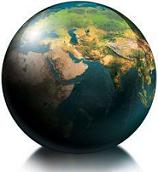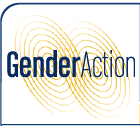|

Gender Action works actively in coalitions to promote gender and climate justice and rights across International Financial Institutions (IFIs) which mightily influence developing countries. Key reasons for our advocacy include: First, almost 80 per cent of economically active women report agriculture and working with natural resources are their primary sources of livelihoods and unpaid work, causing climate change's negative impacts to fall most heavily on women's paid and unpaid work. Environmental degradation also disproportionately impacts LGBTQ+ people because their marginalized position in society makes them more likely to be poor, lack housing, and face food insecurity and violence. Gender Action's ecofeminism considers ecological including climate dimensions impacts on women's and LGBTQ+ people's rights.
During 2021 CSOs holding IFIs accountable for their investments' harmful climate change impacts have been sending numerous letters to IFI managers, Board and government members demanding an end to fossil fuel financing.
An example is our CSO letter to the World Bank President calling for an end to fossil fuel investments and subsidies while assuring renewable energy access for all.
So far, only one of over a dozen IFIs which Gender Action tracks, the European Union's European Investment Bank, has committed to end fossil fuel investments. We are pressuring other IFIs to make and implement similar commitments, and to do so through an ecofeminist lens.
Green Climate Fund
More than an add-on? Evaluating the integration of gender in Green Climate Fund projects and programs, is a new study by Gender Action and the Heinrich B'll Stiftung Washington DC. More than an add-on? analyzes the extent to which the GCF, the largest global multilateral climate fund, considers gender impacts of its funding portfolio. Although GCF mandated gender integration from its outset, the study found GCF often fails to identify potentially harmful impacts on the most marginalized, disproportionately impacted gender groups -- women and lesbian, gay, bisexual, transgender and queer or questioning (LGBTQ) people. We recommend that GCF and climate finance at large must stop treating gender considerations as 'add-ons' and demonstrate how to do so.
Also see our underlying detailed Pattern Analysis Table and 30 individual project analyses.
Gender Action joined Senegal-based Lumi're Synergie pour le Development (LSD) and the WoMin African Alliance in developing new ecofeminist indicators to assess extractive industry projects. See the first application of these ecofeminist indicators in our new advocacy report described below:
Women Stand their Ground against BIG Coal is Gender Action's newest field-based case study, which we co-sponsored with two African partners' Senegal-based Lumi're Synergie pour le Development (LSD) and the WoMin African Alliance. Women Stand their Ground highlights the deleterious impacts of the public African Development Bank (AfDB)-financed Sendou coal plant on people, particularly women, and ecosystems, amidst the world's intensifying climate emergency. Women fishers in Bargny, Senegal, are leading a fight against the coal plant also co-funded by the public West African Development Bank (BOAD) and Netherlands Development Bank (FMO) and private Compagnie Bancaire de l'Afrique de l'Ouest (CBAO). The has destroyed women fishers' livelihoods and undermined the health of community members. Although the AfDB announced in late 2019 it would exit new coal projects, Sendou, which began operating in 2018, will generate coal-fired power and pollutants harmful to people's health for decades. Women Stand their Ground employs a groundbreaking ecofeminist impact assessment framework which underlines how the climate crisis particularly impacts African women who carry primary responsibility, based on the current gender division of labour, for putting food on tables and caring for people and ecosystems.
This new Guide to Women's Rights and Environmental Justice Advocacy on International Financial Institutions is a joint Gender Action, Global Alliance for Green and Gender Action (GAGGA), and Both ENDS publication. The Guide is a tool for women's rights and other groups' advocacy on the IFIs to ensure IFIs uphold and do not undermine rights to clean water, food and a healthy and safe environment.
In this article Elaine Zuckerman explores harmful gender and environmental issues that likely mining activity in Haiti would generate. Women, who primarily steward Haiti's land, forests, water and eco-systems that sustain their households could lose access to natural resources and livelihoods and suffer sexual violence triggered by potential mining. The Haiti Advocacy Working Group, which Gender Action co-founded in 2010, published by the article.
November 2012
Gender Action and the Heinrich Böll Foundation's newly released report "From Ignorance to Inclusion: Gender-Responsive Multilateral Adaptation Investments in the Middle East and North Africa (MENA) Region" exposes women's persistent marginalization from climate adaptation projects. Across the MENA region, where women already suffer from social and political exclusion, climate change is expected to further exacerbate existing gender inequalities. Despite this, our report finds that multilateral development investments, like those of the World Bank, have not prioritized gender-sensitivity in adaptation projects.
Based on in-depth gender analysis of all of the active multilateral climate change adaptation-related projects in the MENA region, the report finds that too often these investments view women as passive victims of climate change, ignoring their extensive expertise and agency in adaptation activities. This both compromises women's human rights and undermines the effectiveness of climate smart projects. The report recommends that multilateral investments integrate gender dimensions and promote women's involvement as leaders in climate change adaptation and environmental management. "Ignorance to Inclusion" reinforces Gender Action and the Heinrich Böll Foundation's efforts to promote women's full, consistent and meaningful participation in climate change investments.
September 2011
Based on fieldwork done with Friends of the Earth member groups in Cameroon, Nigeria, Togo and Ghana, Broken Promises reveals that the Chad-Cameroon and West African pipelines, financed by the World Bank, increased women's poverty and dependence on men; caused ecological degradation that destroyed women's livelihoods; discriminated against women in employment and compensation; excluded women in consultation processes; and led to increased prostitution.
September 2011
As the international community mobilizes in response to global climate changes, climate change mechanisms must ensure the equitable and effective allocation of funds for the world's most vulnerable populations. Gender Action's new publication, Governing Climate Funds:
What Will Work for Women?, highlights women and girls' disproportionate vulnerability to negative climate change impacts in developing countries, and demonstrates how they have been largely excluded from climate change finance policies and programs. The report examines two climate funds and two non-climate funds in order to learn how gender can be better integrated in global climate finance mechanisms. We show that women and girls must not only be included in adaptive and mitigative activities, but also recognized and supported as agents of change who are essential to the success of climate change interventions.
February 2009
Doubling the Damage, published with support from the Heinrich Boell Foundation,
explores the linkages between climate change, gender justice and the World Bank's new Climate
Investment Funds. The paper outlines how the new Funds entirely ignore gender considerations, thus
undermining gender justice and disproportionately harming poor women. Doubling forms the basis for
civil society advocacy urging CIFs to address gender issues and monitoring CIF implementation for
gender sensitivity in future.
September 2008
The publication
assessed public funding to assist Tsunami victims, the majority of whom were
women. This report demonstrated the failure of the World Bank administered
Multi Donor Trust Fund (MDF) for Indonesia's tsunami and earthquake
reconstruction to systematically address gender concerns in the design of its
projects despite MDF promises to do so. GenderAction developed a scorecard
system to rate the integration of gender issues into the project design.
Ultimately, the overwhelming majority of MDF projects earned failing grades on
their scorecards. We concluded that the MDF and World Bank failed to fulfill their
promises to ensure that MDF projects address women's and gender concerns
despite ample opportunity to do so. Gender Action recommended that the MDF
improve their track record by enhancing the gender integration of existing MDF
projects and ensuring that subsequent projects address gender issues.
A Report by Gender Action and CEE Bankwatch Network, September
2006
This report, jointly published by Gender Action and Central and Eastern European Bankwatch Network (CEE Bankwatch Network), found that IFI extractive industry projects increase prostitution, HIV/AIDS and human trafficking. Boom Time Blues received significant press and spurred the World Bank to create a webpage dedicated to Extractive Industries and Gender which calls for “the improvement of the impact of extractive industries on women.” Since historically Bank web pages do not translate into more gender-sensitive investments, Gender Action continues monitoring and advocacy to hold the Bank to its promises.
|
